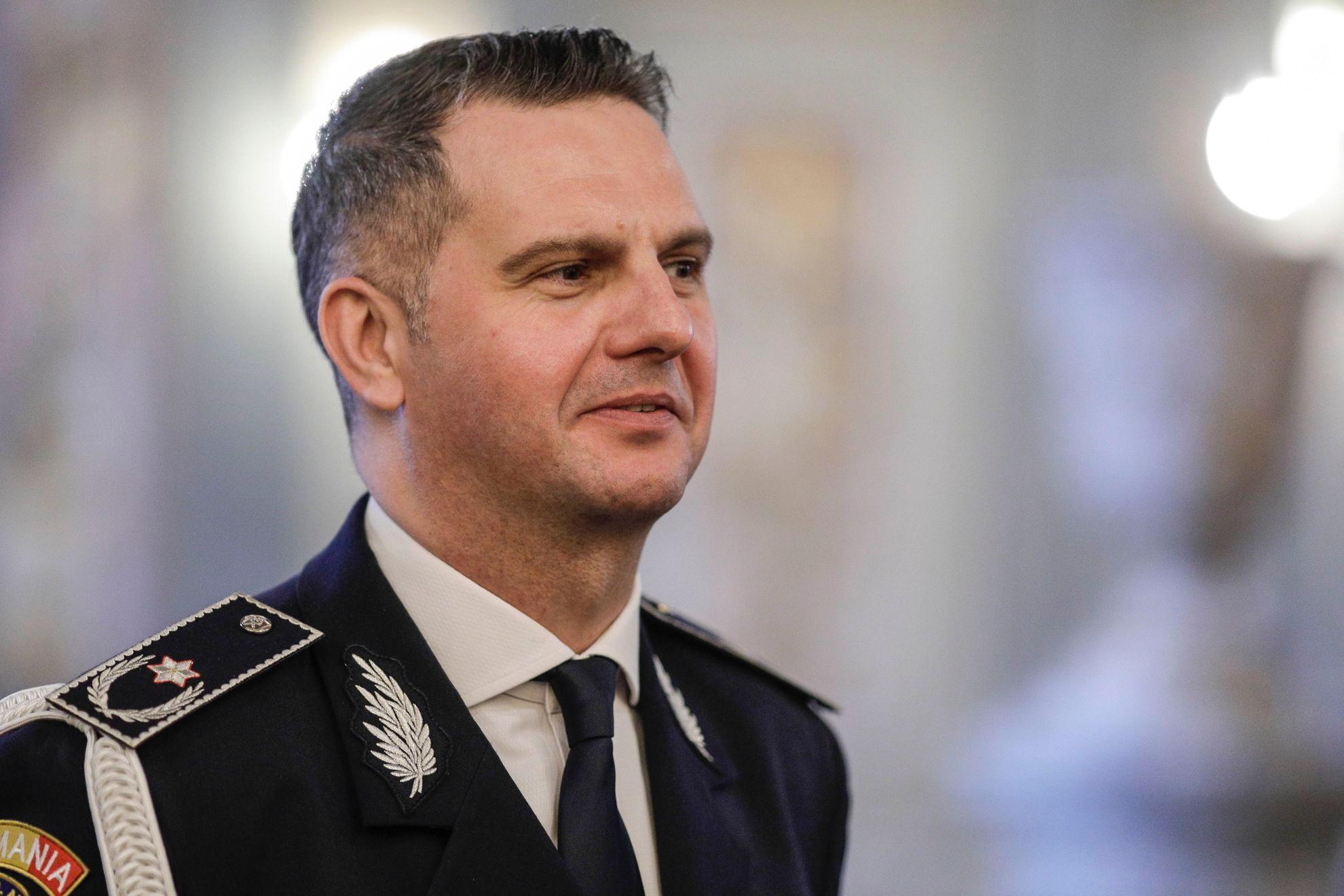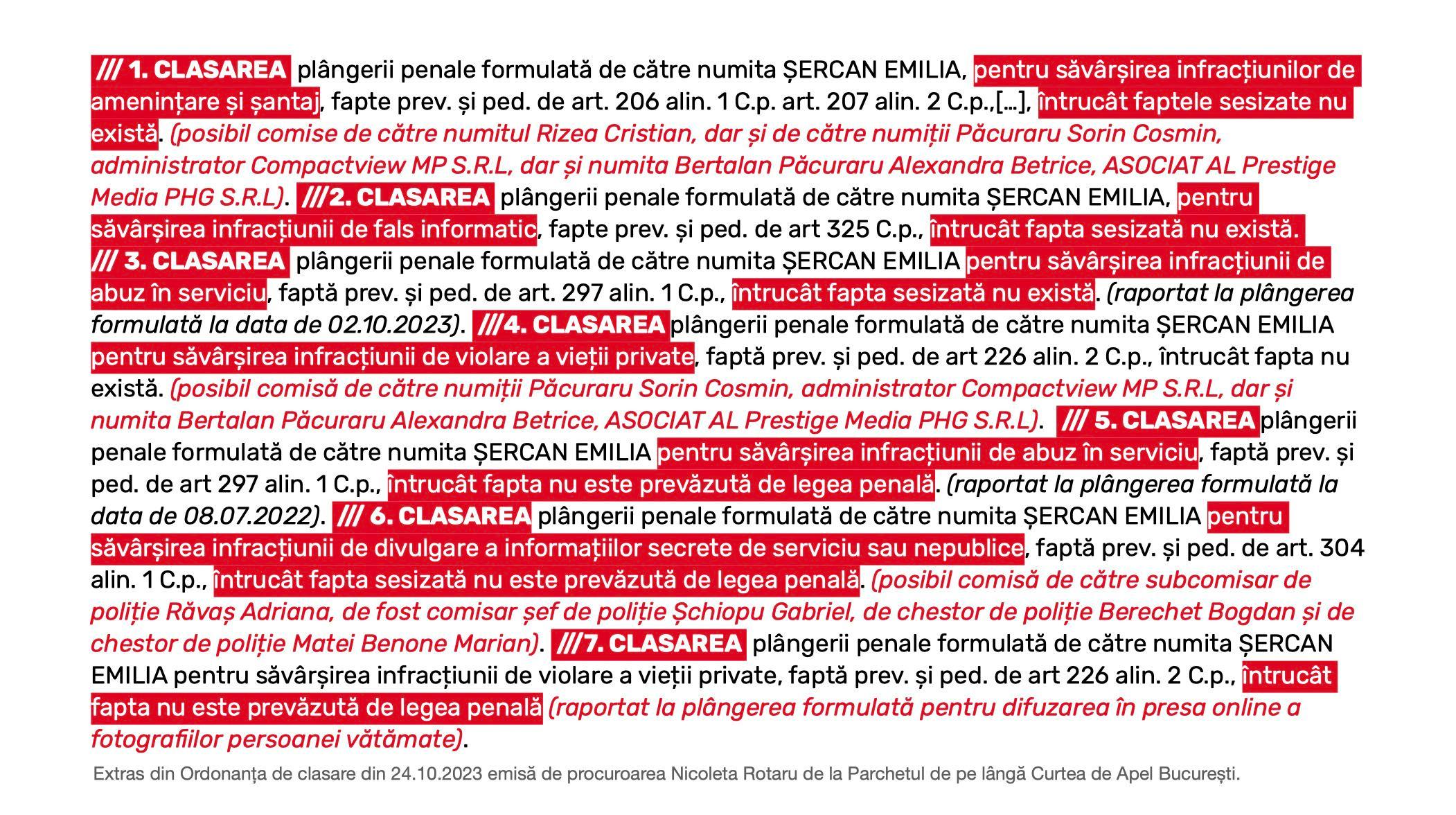
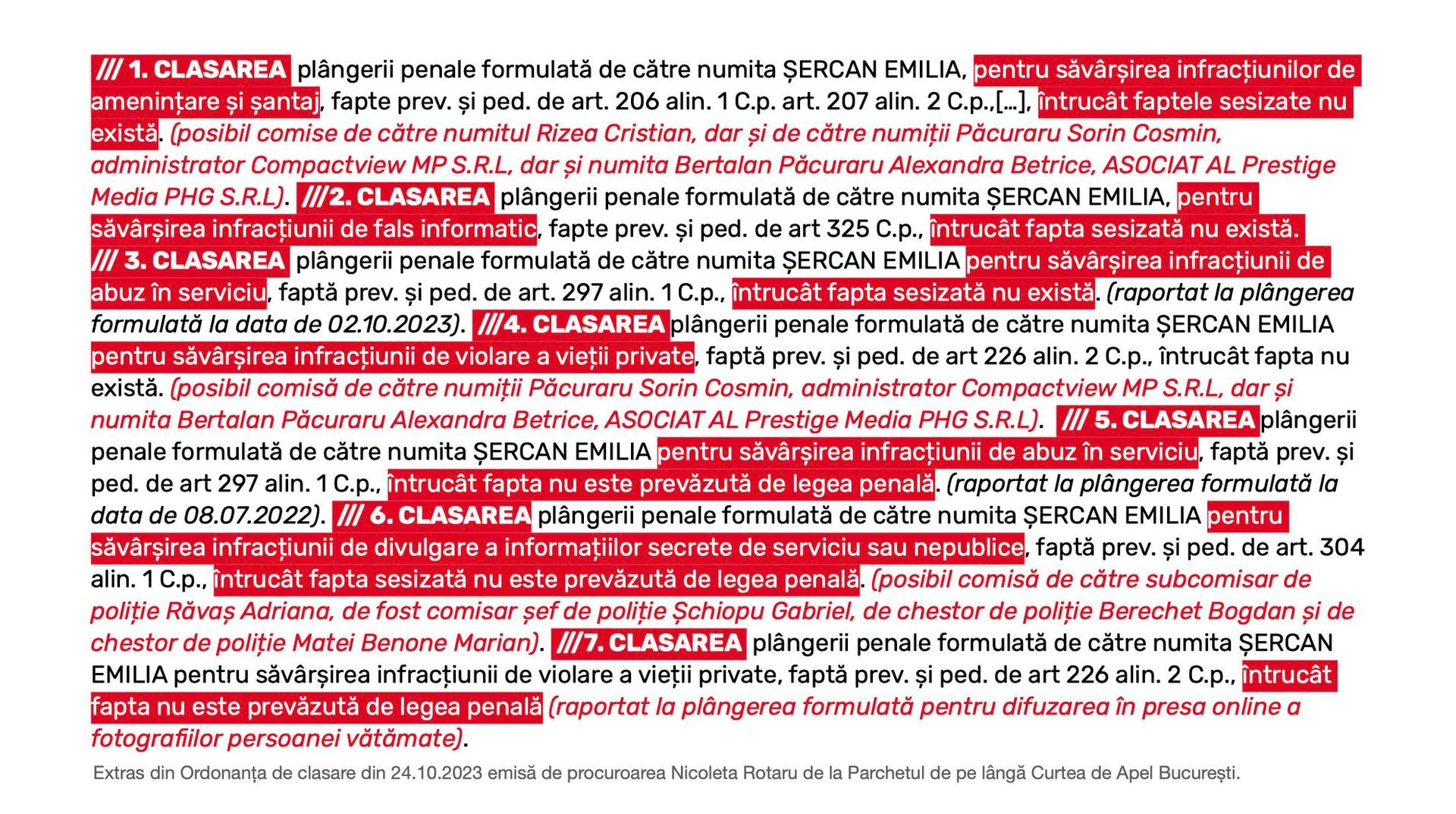
Prosecutor's Office abruptly closes kompromat case: the act of leaking evidence from the Romanian police "is not provided for by criminal law"
Corupție
06/11/2023
The Bucharest Court of Appeal Prosecutor's Office (PCAB) has closed the investigation on the kompromat operation which targeted me last year, shortly after I revealed that the then Prime Minister Nicolae Ciucă's PhD thesis was plagiarized.
The decision to quickly close the case was taken by the General Prosecutor's Office, which has sent a guidance and control note to the PCAB requesting that "measures be taken to quicken the resolution of the case by the end of October 2023".
Read the Romanian version here.
Prosecutor Nicoleta Rotaru of the PCAB decided, in connection with the leak of evidence from the Romanian Police - published on the website of the convicted offender Cristian Rizea 40 minutes after I left the police station - and with the cover-up of the leak and the repeated publication of private pictures, that the following 7 crimes do not exist:
- disclosure of secret or non-public information from the Romanian Police (by publishing on 17 February 2022 a screenshot handed over by me to the police, as evidence, on the website realitateadinmoldova[.]md, owned by the convicted offender Cristian Rizea) - "the offence is not provided for by the criminal law";
- violation of privacy (by publishing the photos on 17 February 2022 on the website realitateadinmoldova[.]md, owned by the convicted offender Cristian Rizea, which were subsequently distributed on 78 other websites) - "the offence is not provided for by criminal law";
- violation of privacy (by republishing the photos on 20 June 2022 on the websites realitateadinmoldova[.]net, part of the Realitatea Plus media group, and realitateadinmoldova[.]md, and subsequently distributed on 45 other websites) - "the offence does not exist";
- abuse of office (concerning the proper handling by the Romanian police of the evidence published on the website realitateadinmoldova[.]md, owned by the convicted offender Cristian Rizea) - "the offence does not exist";
- abuse of office (concerning the Romanian Police's hindering of the criminal investigation in relation to the disclosure of evidence) - "the offence does not exist";
Mulți ne citesc, puțini ne susțin. Fără ajutorul tău, nu putem continua să scriem astfel de articole. Cu doar 5 euro pe lună ne poți ajuta mai mult decât crezi și poți face diferența chiar acum!
- computer forgery (relating to the backdating of material published on the patrianoastra[.]com website, used by unknown authors to cover up the leak of evidence from the Romanian Police) - "the offence does not exist";
- threat and blackmail (by republishing the stolen pictures on 20 June 2022 on the websites realitateadinmoldova[.]net, part of the Realitatea Plus media group, and realitateadinmoldova[.]md, and subsequently distributed on 78 other websites) - "the offence does not exist".
For two other offences, prosecutor Nicoleta Rotaru ruled as follows:
- for illegal access to a computer system, i.e. for the theft of 5 personal photos, "the statute of limitations has expired";
- for violation of privacy by publishing 5 personal photos on 31 adult websites, the case was ordered "to be discontinued [from the current case] and further investigated".
Ministrul Valentin Popa s-a autoplagiat în trei articole științifice
Se comite autoplagiat când un autor publică o lucrare de două sau de mai multe ori, fără a menționa că respectivul text a mai apărut anterior.
ANALIZĂ / ÎN DERIVĂ: România, sever retrogradată de la „democrație deficitară” la „regim hibrid” în Indexul Democrației 2024. Câteva explicații
România a devenit singura țară membră UE clasificată ca “regim hibrid”, asemeni Turciei și Serbiei, ca urmare a uneia dintre cele mai accentuate prăbușiri ale indicatorilor democratici înregistrate în 2024 în clasamentul global întocmit de Economist Intelligence Unit (EIU);
The decision to close this case comes 22 days after the 4th District Prosecutor's Office dropped the investigation in another case, the one concerning threats I have received by e-mail, on the grounds that further investigation "is not of public interest" - even though the ordinance states that the threat was explicitly related to my investigation into the plagiarism of Prime Minister Nicolae Ciucă.
Un newsletter pentru cititori curioși și inteligenți.
Sunt curios
The police leaked an evidence, the Public Prosecutor's Office buried the investigation
Thus, after 20 months of investigation, the PCAB concluded that the publication on the internet of evidence from a criminal case opened by the police does not fall under the Romanian Criminal Code and that the repeated publication on the internet of intimate photos is not a violation of my privacy.
The decision to close the case quickly was, in fact, made by the General Prosecutor's Office.
In recent months, I have repeatedly reported to the General Prosecutor's Office, including through several memoranda and complaints, that Prosecutor Nicoleta Rotaru violated my rights, guaranteed under the law, and refused to administer essential evidence, requested by me, which could have led to the identification of the perpetrators and the establishment of guilt.
Totally unexpectedly, in early October, I received a call from the First Deputy Prosecutor General, Aurel-Sebastian Vălean, who told me that he could see me urgently, that very day, for an audience I had repeatedly requested.
During the meeting with prosecutor Aurel-Sebastian Vălean, I anticipated that the kompromat case was set to be closed after he informed me that he had sent a guidance and control note to the PCAB to "push for a solution on the case by the end of November".
Vălean also told me that some of the requests I made to the General Prosecutor's Office this summer, in a memo, are justified, for example the merging of the two files related to the publication and republication of my photos and their integrated investigation.
I found the decision surprising because my multiple requests to merge the files had been systematically rejected by both the case prosecutor and the General Prosecutor's Office, most recently in July 2023.
Moreover, in the case in which the Public Prosecutor's Office from District 1 was investigating the republication of photos, on 20 June 2022, on a website owned by the family of Maricel Păcuraru, the shadowy owner of the media group Realitatea Plus, and one of the convicted offender Cristian Rizea, the prosecutor came extremely close to elucidating the context of the republication.
I told the First Deputy Prosecutor General that I can understand the surprising decision to admit the merger request only by the fact that the prosecutor got too close to Maricel Păcuraru's family and Realitatea Plus, which together with Cristian Rizea took part in the execution of the kompromat operation.
I also told him that the only way to resolve the case in six weeks, i.e. by the end of November, was to close the case.
"Justice therefore wants to offer a peaceful electoral campaign to the presidential candidate Nicolae Ciucă", I said directly to the First Deputy Prosecutor General, Aurel-Sebastian Vălean. (At the time of publishing this article, several publications had picked up statements in which Nicolae Ciucă, president of the National Liberal Party, announced his intention to run for president next year).
I asked Prosecutor Vălean, during the hearing, to take the files for investigation at the General Prosecutor's Office, a request I have made several times, but which was systematically rejected.
He told me that he would discuss my request with General Prosecutor, Alex Florența. (On 19 October I received an address informing me that the file could not be taken over by the General Prosecutor's Office because of the institution is understaffed).
At the end of the audience on 10 October, Vălean handed me a sealed envelope containing an address which ended as follows: "Measures have been taken to speed up the resolution of the case by the end of October 2023".
So, the Prosecutor General's Office had set a "resolution of the case" by the end of October 2023, not by the end of November, as Vălean told me.
The decision to close the case, according to the date of the order's drafting, was given on 24 October 2023, exactly two weeks after the audience with Prosecutor Vălean.
Shortly before the closure, two files, in which I had complained about leakage of evidence from the Police and then the cover-up of the leakage of evidence, and which were being investigated in two different prosecutor's offices, were merged with the PCAB file:
- case 1319/P/2022, at the Bucharest Public Prosecutor's Office, in which I complained about the theft of photos and violation of privacy by publishing them on 31 adult websites;
- case 5822/P/2022, at the Sector 1 Public Prosecutor's Office, in which I had complained of violation of privacy through the republication of photos, threats and blackmail.
In this article I will explain two essential aspects of this judicial infamy, whose resolution was dictated by the General Prosecutor's Office and executed by the Prosecutor's Office of the Bucharest Court of Appeal:
- the context that led to the hasty closure of the case;
- who justice is protecting in this case.
1. The context that led to the hasty closure of the kompromat case
A turning point, which hastened the closure of the case, was the abrupt change in the status of Cristian Rizea, a key figure in the kompromat operation, from fugitive to prisoner in the custody of the Romanian authorities.
Rizea is the one who published, just 40 minutes after I left the police station, the screenshot that became evidence in the criminal case, so he is the man who knows exactly who provided the image.
At the time of publication of the evidence, 17 February 2022, Rizea - sentenced to four years and eight months - had been a fugitive in Moldova for three years.
When interviewed by rogatory commission by Moldovan prosecutors, Rizea stated that he received the screenshot and my photos 72 hours before publication, which is not true, given that the screenshot was taken only 18 hours before he published it.
Later, he said on Facebook and Realitatea Plus that he "exclusively" published my photos and screenshot, claiming that by publishing them he "saved Romania's Prime Minister" and "buried Emilia Șercan for good". The background can be read here.
Rizea's status suddenly changed on 27 April 2023, when the authorities of the Republic of Moldova declared him an undesirable person and expelled him, and the Romanian authorities were forced to incarcerate him in Rahova Penitentiary to serve his sentence.
Prosecutor Nicoleta Rotaru, who was investigating the leak of the police evidence - and found that at least 7 police officers had received the evidence on WhatsApp before Rizea published it - did not call him to a hearing in the weeks following his imprisonment.
As a result, in June 2023 I formally requested a hearing of Rizea in two cases:
- the prosecutor of the Sector 1 Public Prosecutor's Office, which was investigating the republication of my photographs in case 5822/P/2022, rejected my request, arguing that hearing Cristian Rizea "is not useful for the criminal investigation".
- Prosecutor Nicoleta Rotaru of the PCAB, who was investigating the leak of evidence from the police to Cristian Rizea in case 421/P/2022, admitted my request, but did not notify my lawyer, thus violating my legal right to be represented at the hearing I requested.
The mysterious hearing of the key witness
Prosecutor Nicoleta Rotaru decided not to hear Rizea personally - although she had previously carried out all the prosecution proceedings herself, including the hearing of witnesses - but delegated a police officer to handle this procedure.
On August 3, the delegated police officer presented himself at Rahova Penitentiary, but the hearing did not take place because Rizea declared that he wanted the procedure to take place in the presence of his lawyer, who was on vacation at the time.
On August 11, 2023, the delegated officer went to Rahova again, but this time the hearing did not take place either. Cristian Rizea declared then that he knew things "that could clarify all aspects of the case", but also that "I request the status of witness with protected identity and I wish to have the benefits conferred by law following the facts I wish to denounce".
On 4 September 2023, 24 days after his statement in which he expressed his desire "to denounce facts", Cristian Rizea was brought to the PCAB to be heard in the presence of his lawyer, Alice Drăghici, by the prosecutor Nicoleta Rotaru.
Prosecutor Rotaru did not notify my lawyer, as required by law, to attend the hearing.
After Rizea initially stated that he could disclose to the prosecutor information "that could shed light on all aspects of this case" provided that his identity was protected, this time he decided that he did not wish to make any further statements, taking advantage of his right to silence in order not to incriminate himself.
Cristian Rizea was therefore aware that he had committed a criminal act since he reserved the right to remain silent in order not to incriminate himself.
But what was discussed at that hearing, beyond what is recorded in the witness statement, is impossible to know as long as my lawyer was not present.
Why did the prosecutor Nicoleta Rotaru not want my lawyer to be present at Cristian Rizea's hearing, when she notified me in the case of other witness hearings?
Although Cristian Rizea has invoked his right not to incriminate himself, by the decision to dismiss the crimes for which I have indicated Rizea as presumed guilty, prosecutor Nicoleta Rotaru claims that he has not, in fact, committed any crime.
Thus, one month and 20 days after Rizea reserved his right to remain silent, the case was closed and Rizea was cleared of any guilt.
Screenshot's circuit inside the Police Station
The screenshot published by Rizea came into the possession of the Romanian Police on the morning of 17 February 2022, when I handed it over to a policewoman from the Criminal Investigation Service (SIC) of the Bucharest Police.
The screenshot, taken with my phone, includes a message received the previous evening from a stranger via Facebook Messenger, and shows that 5 personal photos were in the possession of a person I don't know. I later found that the photos had been uploaded to 31 adult sites.
4 hours and 22 minutes after I gave the policewoman the evidence and only 40 minutes after I left the police station, Cristian Rizea published on his website - realitateadinmoldova[.]md - both the evidence and the 5 photos I had just reported stolen.
Cristian Rizea has publicly assumed - through several live sessions on his Facebook page, but also on Realitatea Plus - not only the publication of the photos and the evidence, but even their publication "exclusively".
The policewoman had sent the evidence to the head of SIC within the Bucharest Police, Gabriel Șchiopu, now retired, 13 minutes after receiving it from me, and after another 37 minutes to the head of the Bucharest Police, chestor Bogdan Berechet.
Berechet passed the evidence on to the head of the Romanian Police, chestor Benone Matei, as well as to at least 4 other Romanian Police chiefs.
It is certain, therefore, that the image - which had the status of evidence in a criminal case - circulated for hours inside the police, via WhatsApp, before it was published by Rizea.
The hypothesis that one of those who had access to the evidence disclosed it, in violation of the law, was the basis of the criminal complaint I filed, since I had not distributed it to anyone except policewoman Adriana Răvaș.
The offence, investigated by prosecutor Nicoleta Rotaru since April 2022, was classified under Article 304 of the Criminal Code: disclosure of secret information or non-public information.
How the police disclosure of evidence is justified by the prosecutor
Prosecutor Nicoleta Rotaru decided to classify the offence of disclosing secret or non-public information from the Romanian Police on the grounds that "the offence is not provided for by criminal law".
This reasoning is given when there is not a complete correspondence between the offence committed and the legal definition of the offence in question.
Therefore, Prosecutor Rotaru claims that the offence of disclosing secret or non-public information of the Romanian Police existed, but, she claims, she failed to establish a correlation between the offence and the typical elements of this crime.
The prosecutor's motivation for classifying the offence of disclosing the screenshot published by Rizea is based on an assumption - which has not the slightest evidentiary basis - that the screenshot could have been stolen from my phone.
In May 2022, the prosecutor Nicoleta Rotaru asked for my phone and SIM card to search them, on the grounds that she wanted to eliminate the possibility that my phone had been spied on and the capture had been taken from it.
Inexplicably, the prosecutor did not, in parallel, order a computer search of the phones of the policemen who sent each other the screenshot before publishing it on the Internet, eliminating the hypothesis that they could have leaked the evidence to Rizea, to discredit me, since 2015 I have published dozens of investigations about plagiarists in the Romanian Police and about the plagiarism factory in the Police Academy, and in 2019 I was threatened with death by a police officer, at the instigation of the rector and pro-rector of this Academy, confirmed by a final court sentence.
Neither at that time nor subsequently in the file was there any indication that my phone had been spied on.
I refused to have my phone searched for the following reasons:
- my phone had already been checked, at my request, by Amnesty Tech, CitizenLab and Bitdefender, none of which found any evidence of spying;
- if I had any suspicion of espionage against me, I would have filed a criminal complaint for this crime, without the slightest hesitation, and I would have publicly denounced this extremely serious act against a journalist;
- the search procedure was to be carried out by the police, i.e. the structure I had accused of involvement in the kompromat operation whose objective was to discredit me publicly;
- there was already evidence on file that the evidence had reached a number of police officers who were not forensic police officers and who had illegally received the WhatsApp screenshot;
- as a journalist, I have a professional obligation to protect my sources, and a search of my phone could have led to their disclosure.
When I was asked for my phone to be searched, I told Prosecutor Rotaru that I would accept the search of my phone after the phones of the police chiefs to whom the evidence had been illegally handed over had been searched and only if the search was carried out by a foreign entity.
Knowing that my accusation - of leaking police evidence - is an extremely serious one, I have taken solid assurances that I am not wrong, which is why I myself requested the phone to be analyzed by three globally recognized entities for cybersecurity expertise.
Prosecutor Rotaru did not subsequently return with a request for an expert examination of my phone by a foreign entity.
***
Another reason invoked by the prosecutor who issued the decision to close the case was that "it did not appear that the dissemination in the press of the «evidence» claimed by the injured party was the result of unlawful activities of police workers within the Romanian Police".
Rotaru also noted that the purpose for which policewoman Adriana Răvaș, to whom I handed the screenshot on the morning of 17 February, sent the evidence to her direct chief and to the Bucharest Police Chief was to "identify the person hiding behind the Facebook profile «Paraipan Acuză»".
This statement is totally false.
From the WhatsApp conversations between policewoman Adriana Răvaș and her chief, Gabriel Șchiopu, and with the Bucharest Police Chief, Bogdan Berechet, it does not appear that she asked the two for help in identifying the person who sent me the Facebook message.
After sending the screenshot to Șchiopu, Răvaș tells him: "I'm giving this just for you", and then continues "Berechet called me earlier to give it to him" - a reference to Bogdan Berechet, the Bucharest Police Chief.
The statement "this is just for you" cannot, under any circumstances, be categorized as a request for help in identifying the person who sent me the Facebook message.
Nor does the statement "Berechet had called me earlier to give it to him" show any connection to any alleged support Berechet offered in identifying the person who had sent me the message.
The written conversation between Răvaș and Berechet shows the latter's interest in my photographs. "Photos did you see them?" asks Berechet, to which Răvaș replies "he just sent me a screenshot with the user and the content of the message". Berechet's reply to this statement was "No photo? Let me know when she comes".
Why was chestor Bogdan Berechet interested in the photos? If Adriana Răvaș asked him to help identify the person who sent me the Facebook message, how could my photos have helped Berechet in his efforts to identify the author of the message?
It is unclear how Berechet helped identify the author of the Facebook message I received, because prosecutor Rotaru refused to establish this.
According to his statements, Berechet sent the evidence both to the Chief of the Romanian Police, chestor Benone Matei, and to four other police chiefs - whom he did not name during the hearings, claiming that he could not remember their names, indicating only that they were heads of police structures, among which he mentioned the intelligence service of the Ministry of Interior, the General Directorate of Internal Protection.
Signs indicating police chiefs' involvement
Here are the clues that show the possible involvement of chestors Berechet and Matei in the disclosure of the evidence and that would have required the search of their phones:
- deleting conversations from the phones by Bogdan Berechet, Benone Matei and Gabriel Șchiopu, who gave the reason that they had no more storage space on their phones, even though as early as 18 February 2022 they knew that I had reported the leakage of evidence, and as police officers and heads of key police structures they had a different understanding of the value of evidence and the fact that the messages they exchanged with each other could exonerate them from any suspicion or guilt;
- the contradictory statements of Bogdan Berechet, who at the hearings in April and November 2022 claimed that he did not remember whether he had given the Chief of the Romanian Police the evidence I had claimed had been disclosed, although in an official document - a Report dated 18 February 2022, submitted to the Internal Control Directorate of the Romanian Police - he stated that he had given the evidence to Matei;
- Bogdan Berechet's inexplicable statement that he does not remember the names of the heads of the Central Information Analysis Unit, the head of Special Operations Directorate, the head of Organized Crime Directorate, the head of the General Directorate of Internal Protection, people with whom he frequently interacts, and to whom he said he would send the evidence;
- Bogdan Berechet's refusal to take a polygraph test;
- the insincere attitude of Benone Matei, who claimed at the hearing in June 2022 that he could not remember whether he had received the screenshot from Bogdan Berechet.
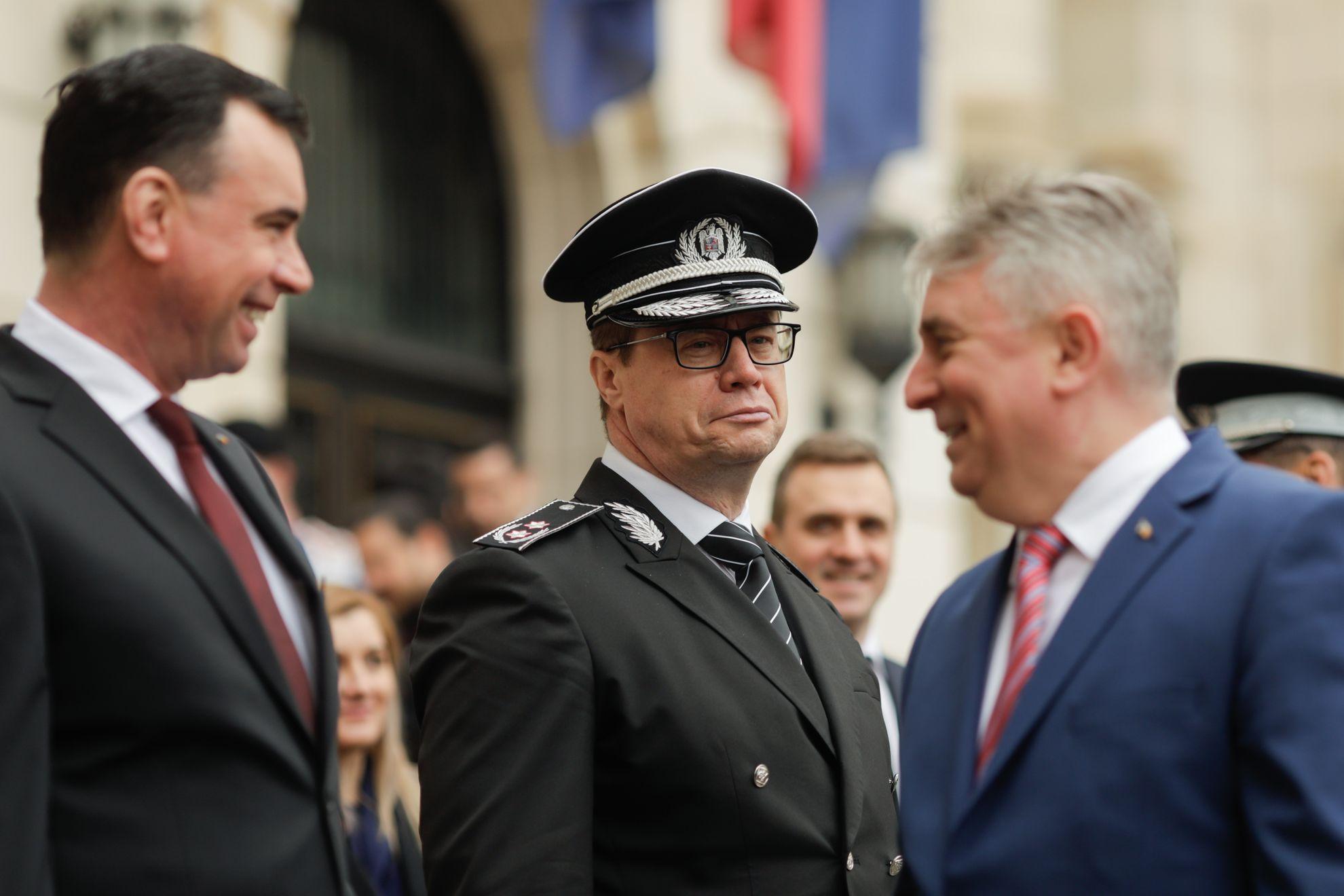
Chestor Benone Matei, head of the Romanian Police Inspectorate General, deleted his WhatsApp messages and told the hearings that he does not remember if Bogdan Berechet sent him the evidence in the criminal case. In the picture, Superintendent Matei with his hierarchical superiors: on the left, Secretary of State in the Ministry of Interior Bogdan Despescu, who plagiarised his doctoral thesis from the Police Academy, and on the right, the Minister of Interior at the time, Lucian Bode, who plagiarised his doctoral thesis from Babeș-Bolyai University. PHOTO: GEORGE CĂLIN, Inquam Photos
How the closure of the cover-up's investigation is motivated by the prosecutor
Accused of leaking evidence from a criminal case for the purpose of compromising me, the Police put forward an institutional version to exonerate it.
According to the Romanian Police, the screenshot was published before I handed it over to policewoman Adriana Răvaș - on the website patrianoastra[.]com, and not on Cristian Rizea's website, realitateadinmoldova[.]md. This is the official conclusion of a document drawn up in February 2022 by the Central Intelligence Analysis Unit (UCAI) of the Police.
Therefore, if the version put forward by the police were true, then the alleged act - the disclosure of evidence in a criminal case - would not have happened and the case could have been closed last year.
However, under these conditions, the premises of a new crime at least as serious would have taken shape: that of spying on a journalist who constantly wrote about political and institutional power in Romania, about heads of secret services, heads of police, justice or other essential institutions of the Romanian state.
This version was quickly embraced by Prosecutor Rotaru, although, as I said before, there is not the slightest indication that I was spied on. If there had been, I would have filed a complaint for committing this crime.
In fact, as early as February 2022, I submitted multiple pieces of evidence to the file demonstrating that the material on patrianoastra[.]com was backdated in order to exonerate the Romanian Police employees guilty of leaking the evidence.
I have also asked Prosecutor Nicoleta Rotaru to establish, beyond any doubt, the website that first published the screenshot: patrianoastra[.]com or realitateadinmoldova[.]md.
At the time the case was closed, it had not been established whether the evidence was published on the internet before I handed it over to the police or after I handed it over and circulated among police officers who were not forensic officers.
However, in the ordinance to close the case, prosecutor Nicoleta Rotaru admits - in several instances - that Cristian Rizea's website is the one that first published the evidence and, implicitly, that the publication took place after I handed over the capture to the police.
Therefore, the prosecutor implicitly admits that the hypothesis put forward by the police does not stand up and that the circumstances are met for the evidence to have been disclosed by the police.
For example, page 28 of the ordinance states: "given that this image (screenshot - n.m.) was first published on 17.02.2022, via the online publication realitateadinmoldova[.]md."
Instead, prosecutor Nicoleta Rotaru argues that the evidence was not disclosed by the police because of the speed with which the screenshot was published on Rizea's website.
"However, the online newspaper realitateadinmoldova.md published the photos of the injured person, as well as the screenshot, on 17.02.2022, around 15:00, shortly after the injured person left the Criminal Investigation Service headquarters".
The prosecutor continues the argument as follows:
"The person named Rizea Cristian, who published those photos and screenshots on 17.02.2022, accompanied them with a press article, which took some time to write and process, so it is possible that he had the screenshot before the injured person sent it to the police worker Răvaș Adriana".
This argument is hilarious and ridiculous.
The prosecutor therefore claims that Rizea needed time to write and process the article in which he published my photos and the evidence I had given to the police.
I gave the proof to policewoman Adriana Răvaș at 10:29 AM. She first sent the photo to her boss, Gabriel Șchiopu, 13 minutes later, at 10:42 AM.
Bucharest Police Chief Bogdan Berechet received the screenshot at 11:06 AM, so 37 minutes later.
Rizea published the material at 14:51 PM, exactly 4 hours and 22 minutes after Adriana Răvaș received the screenshot from me.
The "press article, which took some time to write and process", according to Prosecutor Rotaru's estimate, consists of exactly two and a half lines of text, i.e. 44 words.
Police's cover-up
Returning to the Note made by the Central Intelligence Analysis Unit (UCAI), it was presented to me by the Chief of the Romanian Police, chestor Benone Matei, three days after I discovered and complained about the disclosure of evidence in a criminal case.
As I explained, this Note claimed that the first site to publish the evidence was patrianoastra[.]com, which featured an identical article to that on Cristian Rizea's website realitateadinmoldova[.]md.
The article on patrianoastra[.]com, which also contained the evidence I gave to the police, was published on the morning of 17 February 2022, at 05:45 AM, leaving the impression that the text had appeared many hours before I gave the proof to the police.
As early as last year I published two articles on PressOne in which I proved that the material was backdated. The first article contains data gathered by me and the second article contains evidence discovered by experts from Bitdefender, from Romania, and the Qurium Foundation, from Sweden.
The experts from the two institutions distinctly came to the same conclusion: patrianoastra[.]com uploaded the images to the website on 18 February 2022, within two minutes of each other, from 10:14 AM to 10:15 AM, and the material was backdated - thus inducing the idea that it was published on the morning of 17 February 2022.
Relevant fact: in March 2022, shortly after I challenged the UCAI conclusion and sent a public letter to the President of Romania, the Prime Minister, the Minister of the Interior, the Attorney General and the Chief of the Romanian Police, in which I provided evidence of backdating, the patrianoastra[.]com website was deleted.
Prosecutor Nicoleta Rotaru made, at my request, a preservation request for the electronic data of the patrianoastra[.]com website to the authorities of the United States, which provided a series of information about this site, except for the content, which had been deleted since March 2022.
In January 2023, I made a request for an out-of-court expert opinion so that the public prosecutor's office could independently determine which website first published the screenshot.
For this purpose, we have provided the Prosecutor's Office with the contents of the websites realitateadinmoldova[.]md and patrianoastra[.]com downloaded on March 3, 2022 by Bitdefender.
This request was rejected by the prosecutor, who argued that the expertise could not be carried out because the content of the patrianoastra[.]com website had been deleted, even though the prosecutor was in possession of its content.
Prosecutor Rotaru noted in the closure decision that, in this case, "it could not be proven whether the metadata contained in the article published on the online newspaper patrianoastra[.]com was altered, without right, so as to result in data that are not consistent with the truth".
The fake registration data for a ghost site
All the information provided by the United States authorities about the patrianoastra[.]com website shows that the domain owner provided exclusively false data for registration: name, home address, phone number.
Moreover, payments for domain management were made with bitcoin.
Prosecutor Nicoleta Rotaru did not request the analysis of bitcoin payments from the specialized structure of the Directorate for the Investigation of Organized Crime and Terrorism (DIICOT), which could have led to the identification of the owner of the website patrianoastra[.]com.
Several elements lead to the hypothesis that behind this website - which the head of the Romanian Police, Benone Matei, presented to me as the "zero source" of the kompromat operation - is not a person, but most likely an institutional or state actor who carefully protected his operation:
- all personal registration data of the site administrator are false;
- all logins, without exception, to that site were done through Internet exposure avoidance systems;
- payment for the administration of the site was made with bitcoin, to disguise the identity of the payer.
And even more important than the above information is the motivation why a state actor might have intervened in this case:
- The text on the patrianoastra[.]com website was backdated two hours after I informed the Minister of the Interior in office in February 2022, Lucian Bode, about the leaked police evidence and the kompromat operation;
- The involvement of the Romanian Police in a kompromat operation against an investigative journalist who wrote about plagiarists installed in key positions in the Government, Parliament, Police, Justice, SRI and Army would certainly have caused a real public shock, especially since the operation was orchestrated just one month after the publication of the revelations about the plagiarism of the Prime Minister in office, Nicolae Ciucă.
Moreover, in the file closed the other day there are a number of classified documents to which I have not had access, at least one of which was issued by the intelligence service of the Ministry of Interior, the General Directorate of Internal Protection.
My lawyer, who can have access to classified documents, being the holder of an ORNISS certificate, made a request to see those documents, but the prosecutor Nicoleta Rotaru rejected his request, and the head of the PCAB did not respond to his complaint against the refusal to see those documents.
How the "non-existent" violation of my privacy is justified by the prosecutor
The Prosecutor's Office of the Bucharest Court of Appeal does not consider that the repeated publication on the internet of personal photos that had been stolen from me constitutes a crime.
Prosecutor Nicoleta Rotaru even dismissed the offence of violating my privacy by publishing photos on the website realitateadinmoldova[.]md on 17 February 2022, on the grounds that the offence is not covered by criminal law.
As I have already pointed out, the reasoning that the offence referred to is not provided for by the criminal law may be given when there is not a complete correspondence between the offence committed and the legal definition of that type of offence.
Therefore, the prosecutor found that the offence of violating my privacy by publishing photos on Cristian Rizea's website existed, but, she claims, she failed to establish a correlation between the act and the typical elements of this crime.
For republishing the photos on 20 June 2022 on the websites realitateadinmoldova[.]net, part of the Realitatea Plus media group, and realitateadinmoldova[.]md, the motivation is quite shocking: the fact does not exist.
In the closure order, prosecutor Nicoleta Rotaru claims that the disclosure of my photos was first made on adult websites, at which point, because they became public, the images lost their private nature.
For this reason, in the prosecutor's view, intimate photographs lose their privacy if they have been published once, and their repeated publication does not constitute any offence provided for and punished by criminal law.
Who is the justice system protecting in this case
The scandalous closure of the kompromat case, without identifying a single culprit and without establishing any guilt, is a major failure of justice in Romania, which shows that when people under investigation have public office and political influence, they can be above the law.
The Bucharest Court of Appeal Prosecutor's Office is responsible for a resounding failure to investigate a case involving police chiefs, a media group and a convicted criminal, as well as the interests of members of the government, and in which a state actor was most likely involved.
"There can be no impunity for human rights violations and abuses against journalists," EU High Representative Josep Borrell and European Commission Vice-President Věra Jourová said in a joint statement five days ago on the occasion of the International Day for the Abolition of Impunity for Crimes against Journalists.
The Prosecutor's Office of the Bucharest Court of Appeal categorically denies this claim.
By the decision given in the kompromat case, by the failure to find the guilty and the guilty, the Romanian justice system offers exactly impunity to the guilty, i.e. exemption from criminal liability.
Those who enjoy the legal protection of justice in this case are the following:
- the police officers who leaked the evidence for publication and their superiors who failed to conduct an internal investigation to identify the perpetrators;
- Police intermediaries, who placed the evidence and information that some personal photos of me are published on adult websites;
- the criminal Cristian Rizea, owner of the website realitateadinmoldova[.]md, who published my photos twice;
- the Păcuraru family, owners of the website realitateadinmoldova[.]net, which published my photos and then expanded the distribution of the photos to 68 other sites they control;
- the state actor involved in the cover-up of the police leak, through the website patrianoastra[.]com, purchased with bitcoin and used to fabricate evidence to exonerate the perpetrators of the operation to harass, intimidate and discredit a journalist.
The kompromat file is closely linked to the publication of the investigation in January 2022 into the plagiarism of the then Prime Minister Nicolae Ciucă.
In July 2022, Cristian Rizea claimed that, by publishing my photos, "I have saved Romania's Prime Minister" and "I have buried Emilia Șercan for good".
The abrupt closure of two cases investigating what international jurisprudence calls "character assassination" against a journalist - the one on kompromat and the one in which I was threatened - coincides with feverish preparations for the 2024 election year.
On 1 November, the very day the Bucharest Court of Appeal Prosecutor's Office officially informed me that it had closed the kompromat case, Nicolae Ciucă announced his intention to run for the presidency on behalf of the National Liberal Party.
Romania's justice system, which saved Nicolae Ciucă last year when it blocked an academic body from checking his doctoral thesis after collecting all the original documents, has mobilized again this time, ensuring a peaceful campaign.
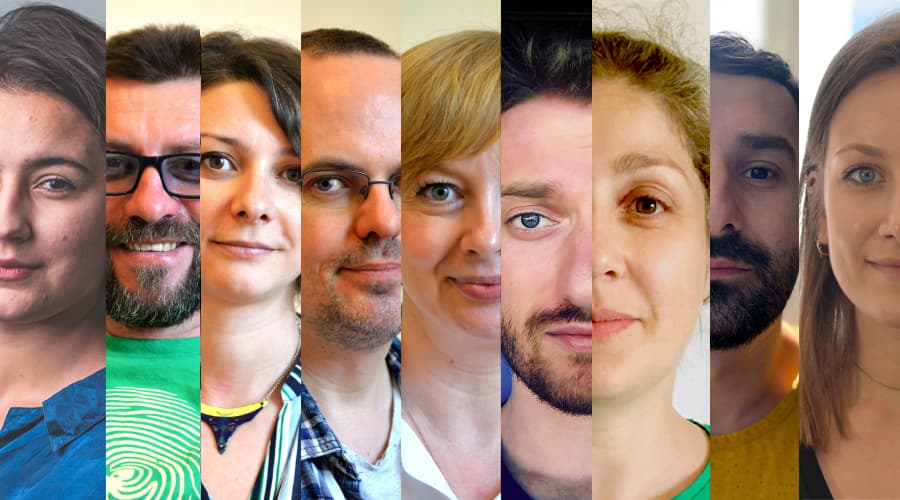
Avem nevoie de ajutorul tău!
Mulți ne citesc, puțini ne susțin. Asta e realitatea. Dar jurnalismul independent și de serviciu public nu se face cu aer, nici cu încurajări, și mai ales nici cu bani de la partide, politicieni sau industriile care creează dependență. Se face, în primul rând, cu bani de la cititori, adică de cei care sunt informați corect, cu mari eforturi, de puținii jurnaliști corecți care au mai rămas în România.
De aceea, este vital pentru noi să fim susținuți de cititorii noștri.
Dacă ne susții cu o sumă mică pe lună sau prin redirecționarea a 3.5% din impozitul tău pe venit, noi vom putea să-ți oferim în continuare jurnalism independent, onest, care merge în profunzime, să ne continuăm lupta contra corupției, plagiatelor, dezinformării, poluării, să facem reportaje imersive despre România reală și să scriem despre oamenii care o transformă în bine. Să dăm zgomotul la o parte și să-ți arătăm ce merită cu adevărat știut din ce se întâmplă în jur.
Ne poți ajuta chiar acum. Orice sumă contează, dar faptul că devii și rămâi abonat PressOne face toată diferența. Poți folosi direct caseta de mai jos sau accesa pagina Susține pentru alte modalități în care ne poți sprijini.
Vrei să ne ajuți? Orice sumă contează.
Share this


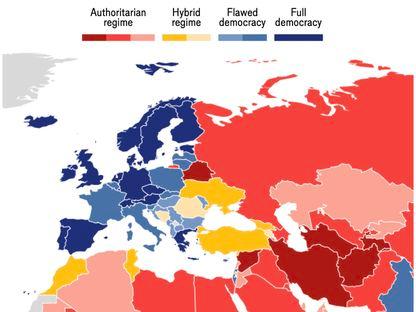
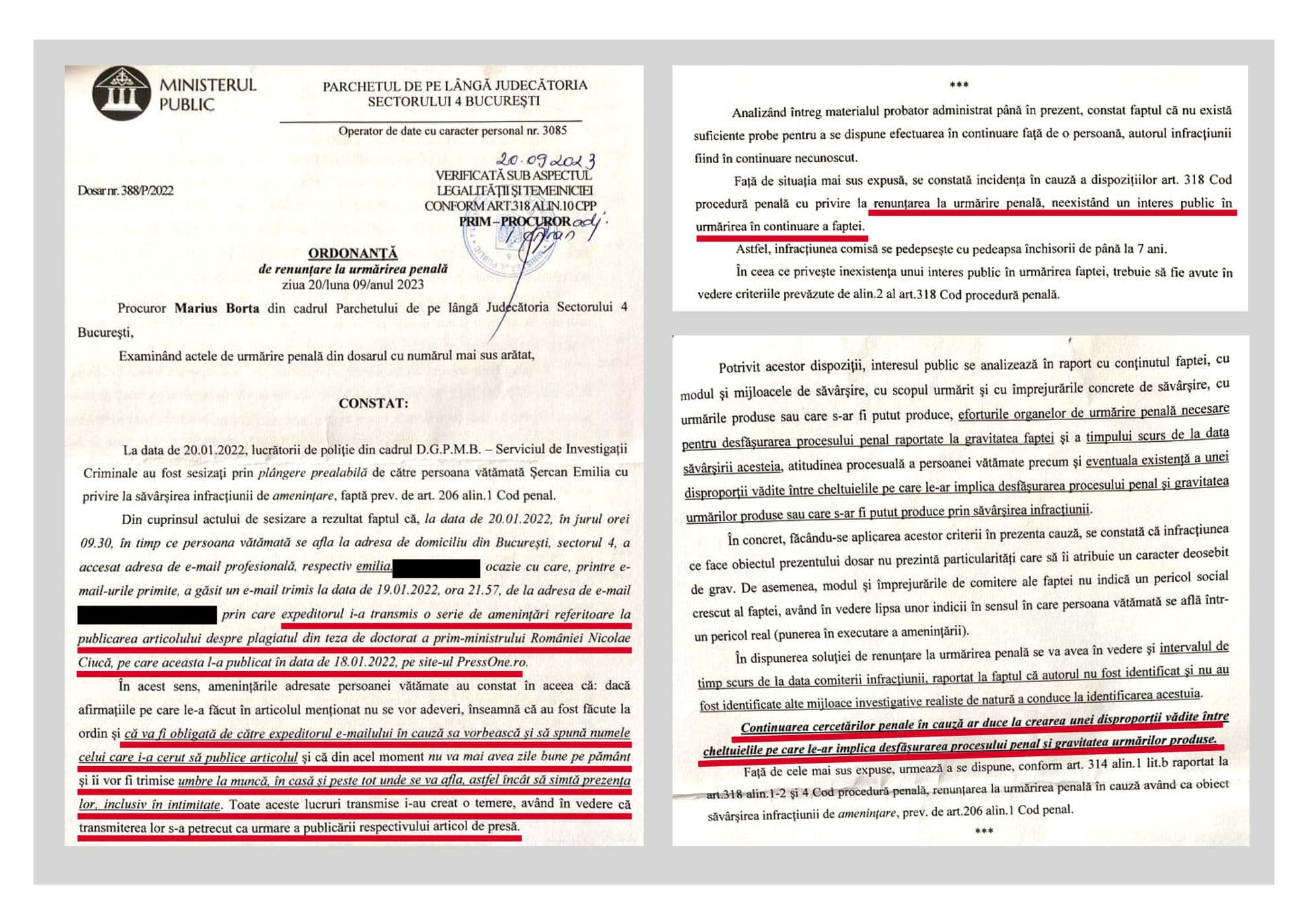
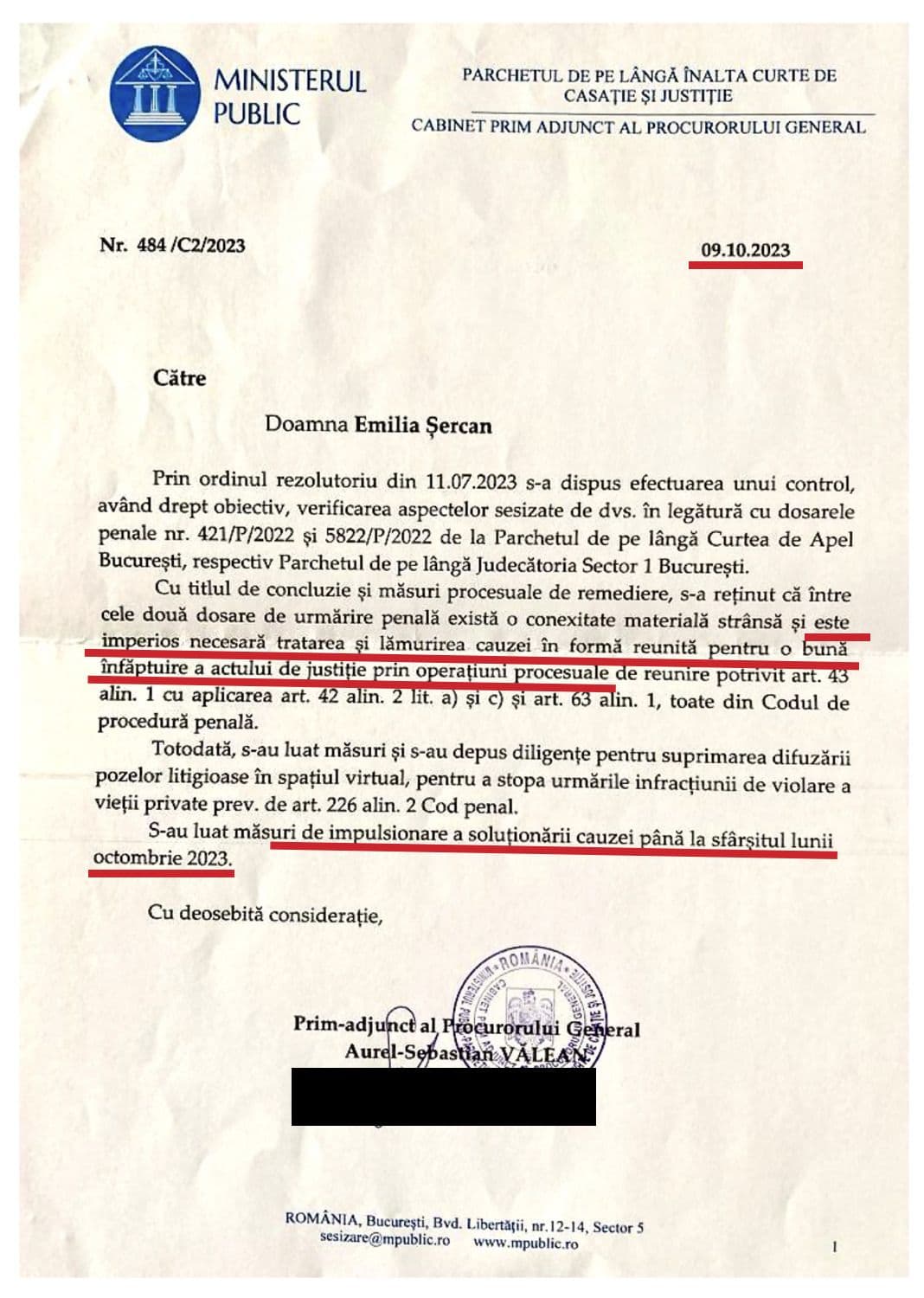
![Screenshot from the website realitateadinmoldova[.]md, deactivated after owner Cristian Rizea was expelled from Moldova](/_next/image?url=https%3A%2F%2Fimg.pressone.ro%2FtG4LIXKskxGz1xKXA-m87KZJ9ss%3D%2F1980x2146%2Fsmart%2Fhttps%253A%252F%252Fimages.pressone.ro%252Fwp-content%252Fuploads%252F2023%252F11%252F05233839%252Frizea-l-a-scapat-pe-premier.jpeg&w=3840&q=75)
